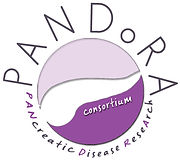



An international consortium for research on
pancreatic cancer

Pancreatic cancer

Risk factors

Genetic susceptibility
Pancreatic cancer is the fourth leading cause of cancer deaths in the European Union and in the USA, with a five-year relative survival of less than 5% particularly for pancreatic ductal adenocarcinoma (PDAC), the most common form of the disease. There is no effective screening test for pancreatic cancer and metastatic disease is often present at initial diagnosis.
Established risk factors include cigarette smoking, obesity and overweight, a medical history of chronic pancreatitis or diabetes type II, and family history of pancreatic cancer.
A small proportion of pancreatic tumors arises as a result of high penetrance germline mutations, usually in the context of familial cancer syndromes. However, the very low frequency of those mutations cannot explain the bulk of genetic susceptibility to pancreatic cancer. In recent years, genome-wide and targeted gene/pathway association studies have started unraveling the genetic architecture of pancreatic cancer risk.
Identifying groups of people in the general population who are at increased risk of developing pancreatic cancer offers the best hope for early diagnosis and therefore for improved prognosis of this terrible disease. One possible strategy for identification of subjects at increased risk is to study genetic factors that affect susceptibility to pancreatic cancer. In this context we have established the Pancreatic Disease ReseArch (PANDoRA) consortium.
Introduction to the PANDoRA consortium. A short info flyer with all the essential information about PANDoRA.
Protocol of the PANDoRA consortium. Explanation of the rationale, past, ongoing and planned projects, publications.
Rules of the PANDoRA consortium. Conditions for participation, steering committee, authorship.
Last updated on 9 September 2019

